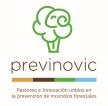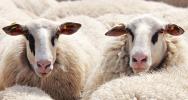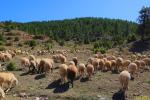QUESONAT Operational Group: Sustainable alternatives to control mold growth in aged cheeses
- Type Operational group
- Status In progress
- Execution 2023 -2026
- Assigned Budget 250.000,00 €
- Scope Autonómico
- Autonomous community Aragón
- Main source of financing CAP 2023-2027
The main objective is to increase the added value of products made from sheep's milk, increase the profitability of the farmers who produce and market it, and find viable solutions to legal and consumer problems. This added value will be achieved by developing an edible rind for the cheese that is safe and environmentally friendly. The rind will be controlled, eliminating molds that could be potentially dangerous to consumers. Chemical additives will not be used to control the rind, thus avoiding health risks and harming the environment.
In addition, tests will be conducted to incorporate a probiotic into the rind, which could offer additional benefits to consumers after consumption. To this end, this project is working on the development of a differentiated range of safe sheep's milk cheeses with edible rinds, free of preservatives and colorings, that can provide health benefits to consumers, boosting the cheese market and, ultimately, the dairy sector in Aragon.
- Obtain a range of sheep cheeses that have a natural rind without preservatives or colorings
- Study the surface flora of cheese and identify the molds that best behave during ripening and are safe for the consumer.
- Develop a “seeding” that homogenizes the bark and facilitates its handling during maturation.
- Reduce the incidence of penetrations into the mass
- To study the behavior and evolution of the probiotic Cordyceps and its action during maturation
- Identify essential oils obtained from local aromatic plants that have a controlling effect on the surface flora of the cheese.
- Minimize the environmental effects of current bark treatments.
- Market these cheeses through the implementation of a marketing and communication plan
- Training prescribers to transfer innovation to the consumer.
- Identification/quantification of the surface flora of cheeses
- Selection of the most suitable and consumer-safe molds for reseeding on ripening cheeses.
- Selection of essential oils at laboratory level that, when mixed with the oil applied during brushing during ripening, help control the development of mycelium on the surface of the cheeses.
- Performing sowing of the probiotic Cordyceps at different stages of maturation.
- Implementation at the industrial level of the procedures developed at the laboratory level. Evaluation of antifungal activity after application in a ripening state under normal operating conditions.
- Tasting of the different cheeses to verify that the characteristics of the cheeses have been maintained or improved.
- Market study to assess the impact of the development carried out with production at the cheese factories' facilities and a representative volume of future industrial production.
- Check the behavior during the product's marketing phase and the possible determination of the shelf life of products in different presentations.
Livestock production and the processing of the products obtained within the same environment are one of the pillars on which the rural economy is based, not only for the activity and quality jobs it directly generates, but also for the significant network of services it creates around it and its potential to establish a stable population. The decline in the meat sheep population in Aragon and Spain since 2000, with the loss of farms and technical assistance services for livestock, is a reality resulting from the economic and social imbalance, as well as the structural deficiencies that the sector has suffered for years. Grupo Pastores and Quearte are two companies with a strong social commitment to the rural areas where they operate.
Over the years, with the aim of developing a new sheep production model linked to the region in Aragon, Grupo Pastores and Quearte have taken steps in all areas, responding to society's new demands for healthy production that is respectful of the environment and the EAF, yet also profitable and attractive to young people in rural areas. Currently, cheese production in Spain is concentrated in other autonomous communities, with Aragon not being a benchmark source of origin. For the economic and productive model we seek to be successful, we must achieve significant differentiation that is appreciated and demanded by consumers.
Developing a cheese made with high-quality milk that incorporates distinctive characteristics compared to what's currently on the market is a challenge that requires a thorough research process. Once achieved, proper promotion and marketing will determine the success of the overall project.
Develop a differentiated range of sheep's milk cheeses, with an edible rind, safe and free of preservatives and colorings, that could provide health benefits to consumers and boost the cheese market and, ultimately, the dairy sheep sector in Aragon.
- Coordinator/entity name: PASTORES GRUPO COOPERATIVO
- Postal address: CAMINO COGULLADA (MERCAZARAGOZA) Pastores Building
- Coordinator/entity email: direccion@oviaragon.com
+34976138050
- PASTORES GRUPO COOPERATIVO
- QUESO ARTESANO DE TERUEL (QUEARTE)(info@quesodealbarracin.es)
- PASTORES GRUPO COOPERATIVO






